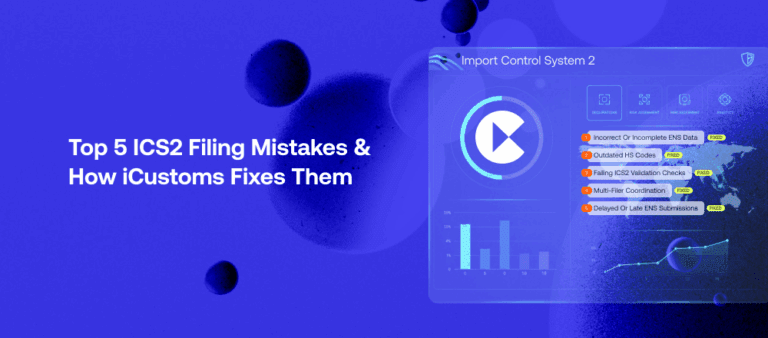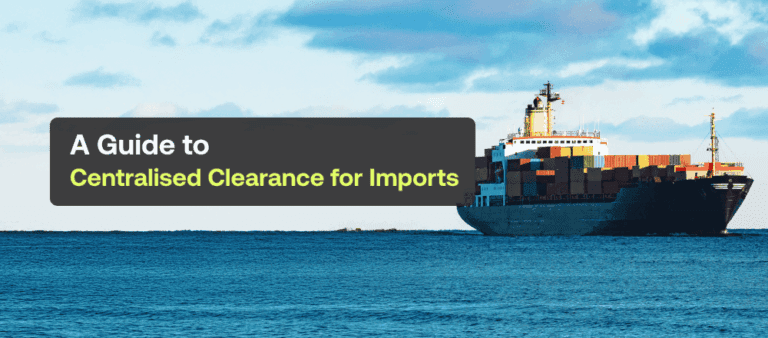A Comprehensive Guide to Customs Declaration
- Freya Jane
- Director of Customer's Success
The number of imports and exports is gradually increasing, as per a study conducted by Govt. UK, “23.8 million export and 67.5 million import declarations were submitted in 2023”. This increasing number emphasises the significance of deep understanding of customs declarations to avoid unnecessary fines and delays.
Mastering customs declarations is crucial for seamless global trade, even amid their complexities. These declarations contain vital details about imported or exported goods, ensuring rule compliance and easing international transactions. Let’s delve into the key aspects of this procedure.
What is a customs declaration?
A legal document containing information about items being imported or exported is called a customs declaration. Typically, it includes:
- Type of goods
- Value
- Quantity
- Country of origin
- Intended purpose
This document is presented to customs officials, allowing them to evaluate applicable duties and taxes, check compliance with trade regulations, and track the movement of products.
Who requires a customs declaration?
When commodities cross borders, a variety of organisations involved in international trade need customs declarations to guarantee regulatory compliance and transparency. Who needs to make these declarations is broken down as follows:
- Importers: When products arrive in a country, individuals or businesses that buy them for commercial use from other countries need CDS import for customs declarations. These declarations describe the kind, quantity, value, and provenance of the imported goods.
- Exporters: Individuals or businesses shipping goods abroad for trade must provide customs declarations. These declarations detail the exported items’ value, description, quantity, and destination country.
- Authorised representatives: Importers and exporters may use customs brokers or authorised representatives to declare goods.
- Logistics companies: Organisations that handle international freight transportation, including freight forwarders or logistics providers, frequently support the customs declaration procedures. As part of their shipping services, they ensure that all required documentation is properly produced and filed.
Where should customs declarations be submitted?
Usually, you’d file it with the customs authority of the country where your goods are entering or leaving. So, if you’re bringing stuff into a country, that country’s customs authority gets your declaration. When you’re shipping goods out, the declaration heads to the authority in the departing country.
HMRC rolled out new customs declaration software, replacing the old CHIEF system. This fresh Customs Declaration Service (CDS) brings changes, shaking up how declarations are handled.
Curious to see what’s different between CHIEF and CDS? Take a peek at the comparison here.
Why should customs declarations be used?
A customs declaration is an important document for international trade, providing several key benefits:
- Duty and tax assessment: When products cross borders, customs officials use declaration information to find out taxes and tariffs. This assessment ensures that appropriate taxes are applied, which contributes to fair trading practices.
- Regulatory compliance: It ensures that traders follow the laws of the countries participating in the trade. By providing specific information about the items being carried, the declaration promotes compliance with trade rules.
- Trade facilitation: Submitting an accurate declaration speeds up the customs clearance process, which accelerates the transfer of commodities across borders.
- Preventing smuggling and illegal trade: Customs declarations help prevent smuggling and illicit trade by stating the kind and value of commodities, encouraging secure international trade.
What benefits can customs declaration software provide?
Businesses engaged in international commerce might profit from customs software in a number of ways:
Accuracy and compliance
The software helps ensure that declarations are truthful and adhere to the import and export country’s customs laws. This lowers the possibility of mistakes, fines, and processing delays throughout the clearing procedure.
Time efficiency
Software-enabled declaration process automation expedites the filing and processing of customs documentation. This effectiveness may result in quicker clearance by customs and, as a result, quicker cross-border transportation of products.
Cost savings
Customs declaration software may help firms cut costs by eliminating human mistakes and optimising workflows. The financial benefits are increased when non-compliance is avoided in the form of penalties and fines.
Transparency and visibility
By offering a consolidated platform for handling customs paperwork, the programme encourages supply chain transparency. Businesses may check the progress of their shipments with this visibility and make appropriate plans.
Risk mitigation
Customs declaration software frequently includes tools that help companies recognise and reduce possible risks, such as delays or compliance problems. This proactive strategy improves the overall management of supply chain risk.
Integration with other systems
A lot of software solutions for customs declarations may be integrated with other corporate systems, such as enterprise resource planning (ERP) or inventory management systems. The integration improves overall corporate productivity and simplifies data flow.
Updates on regulations
Customs laws are subject to regular modification. Software for customs declarations frequently includes tools for monitoring legislative changes, allowing companies to stay in conformity with the most recent standards.
Enhanced security
Through proper recording and reporting, the software may help prevent illicit actions and smuggling, contributing to border security.
Audit trail
Customs declaration software usually keeps a thorough record of all transactions and modifications to declarations. This feature facilitates traceability and might be useful for resolving disputes or audits.
User-friendly interface
Software for customs declarations that has been well-designed has an interface that is easy to use and intuitive, which helps firms streamline the declaration process and lowers the learning curve for users.
How to use iCustoms to simplify customs declarations?
With our cutting-edge iCDS platform, we at iCustoms specialise in simplifying and automating customs declarations. This is how we can assist:
- Automate the procedure of declaring customs.
- Verify compliance with the most recent rules.
- Cut down on processing time and boost productivity.
Take advantage of iCustoms’ automation capabilities to revolutionise your international trade procedures!
Conclusion
Understanding customs declarations is critical for streamlined and compliant international trade. This brief overview emphasises their crucial role in everything from obligation assessment to regulatory compliance. Whether you’re an experienced trader or new to global markets, knowing and negotiating customs declarations is critical for successful cross-border transactions.
Discover how to make customs declarations more efficient with iCustoms, your partner for streamlining international trade.

Tired of spending hours on manual customs procedures?
Let iCDS automate it for you, ensuring faster processing!
You may also like:
Ready to streamline your Customs Declaration Process?
Boost efficiency, reduce errors, and ensure accuracy with iCDS
Subscribe to our Newsletter
About iCustoms
Ready to streamline your Customs Declaration Process?
Boost efficiency, reduce errors, and ensure accuracy with iCDS




